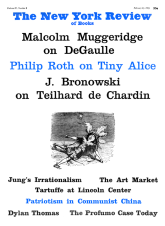In response to:
The Ordeal of George Patton from the December 31, 1964 issue
To the Editors:
Some time ago I sent a postcard to The New York Review mildly protesting against the use of obscenity in what was supposedly a serious review. Since the book under review, a biography of Jean Harlow, seemed to me out of place in your journal, I passed it off as an eccentricity. However, when I encountered the same thing in a review of Patton: Ordeal and Triumph by somebody named John Phillips it seemed to me that a bit more than a mild protest was in order.
If we are to have the television mentality, that is, the mentality that has no sense of grace and decorum, in places where those qualities have always been thought essential, then we are in a dangerous position because we have bereft ourselves of the sense of discrimination which is the foundation of that authority that men of culture assume when they offer criticism of their society and its institutions. The only exception to this point occurs when the criticism is made in the form of art because there the method is exposure rather than exposition.
When the place in question is a book review, another point comes into play—the point of style. Many book reviews, such as that by Mr. Phillips, are very bad because the reviewer does not recognize the special stylistic needs of such writing. The reviewer has two responsibilities: to inform his reader of the book’s content and to evaluate the book’s value. Thus the review involves two very different kinds of writing and the reviewer must have a style adequate to the task. Obscenity does not serve this need because it introduces a style of an entirely different order, and so complicates the reviewer’s problem rather than solves it. It also draws attention to the reviewer so that he rather than the book becomes the review’s subject. ject.
There is finally the specific review that Mr. Phillips has written. It is perfectly obvious, from the way Mr. Phillips has used obscenity, that his purpose was in fact to draw attention to himself. In one case obscenity is used to gain parallel structure (“boggings-down, fuckings-up”) and in another case for alliteration (“fucked up for fair”). It seems to me that the claims of decorum are greater than the claims of alliteration. In reversing those values Mr. Phillips puts emphasis on his style. That is a useful rhetorical strategy in many kinds of writing, but not in book reviews. I might be interested in what Mr. Phillips has to say, but Mr. Phillips himself is a bore.
But what to me is final evidence that the season got to Mr. Phillips’ head and made him think he had to exhibit himself like a tinseled Christmas tree is the confusion he shows in his own values. He has the audacity to sneer at the Daily News for its low tone and jazzy diction when he writes as though his model were page three and, especially, page four of that paper. The confusion becomes ludicrous when he then goes on to sneer at Patton because the General “obscenely chewed out” a soldier “before the assembled patients, doctors, and nurses.” Perhaps Mr. Phillips’ point escapes me, but I take it that Patton is being snered at because of a failure in decorum. If that is so all I can say is: sneers to you Mr. Phillips.
John P. Farrell
Bloomington, Indiana
This Issue
February 25, 1965



